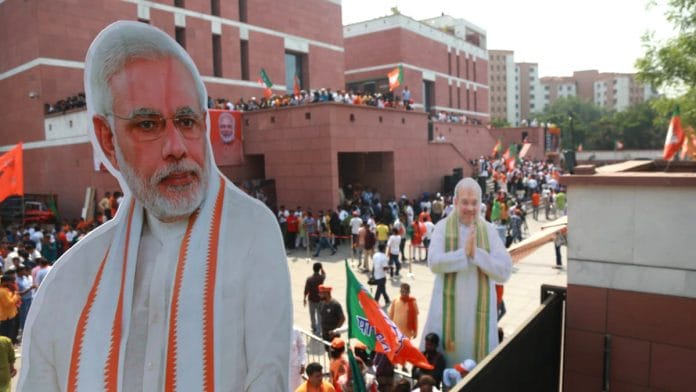New Delhi: The ruling BJP has finally submitted details of who donated electoral bonds to fund the party in the run-up to the Lok Sabha elections — 40 days after the Supreme Court’s deadline and after it emerged that it had received more than 90 per cent of the controversial donations.
The BJP filed the details to the Election Commission (EC) only on 6 July — making it the last of more than 60 political parties to do so.
“At first, instead of the BJP, we received the details from the BJP’s Tripura state unit, which was a bit confusing, since what the court wanted was obviously the consolidated details of the donations received by the parties as a whole,” said an EC official. “But later the party filed the details of its national donations.”
Sources in the poll panel also said that the identity of the real donors may still remain a secret as the bonds do not carry their names and political parties are not legally required to possess the information on who the funders are.
Besides, the commission has to submit the information in a sealed cover to the Supreme Court even though it has been in favour of making the details public.
Also read: Electoral bonds are a constitutional hazard but transparency alone isn’t the solution
‘Can’t open the details due to court order’
Ever since the Modi government first notified the controversial scheme, the EC had been critical of it — officially registering its reservations with the government and calling it a “retrograde step” as far as transparency in electoral funding is concerned.
Even when the matter reached the Supreme Court — petitions were filed by the Communist Party of India (Marxist), along with NGOs Common Cause and the Association for Democratic Reforms (ADR), seeking either a stay on electoral bonds or the identification of purchasers — the EC had opposed the scheme in an affidavit and said that the details be made public.
“We are just the custodians of the parties’ submissions,” a senior EC official said. “Even we are not opening the details since the court wants them in sealed covers.”
While the EC had in its affidavit to the apex court argued in favour of making details of donors public, it is not doing so despite being in possession of these details due to the Supreme Court’s April injunction to submit the details to it in sealed covers.
How parties can circumvent the SC directions
Moreover, according to EC officials, it is quite possible that the parties have simply submitted that they are not in possession of the donor details themselves as, according to the finance ministry notification, the lone bank authorised to sell these bonds, the State Bank of India (SBI), is the only legal entity to have details of the donors.
The SBI, however, seems unwilling to part with any information with regard to the controversial scheme. The bank refused to share information in response to an RTI query by activist Vihar Durve.
The information relating to electoral bonds that is held by the bank is in “fiduciary capacity,” and is hence denied by the SBI, the RTI reply said.
According to the scheme, any donor can go to the SBI and purchase an electoral bond, which is essentially a promissory note that carries neither the name of the buyer nor the payee. The donor can then pass on the bond to a political party, which can get it encashed from SBI.
Also read: Electoral bonds help BJP coerce donors & that’s why Arun Jaitley rises to their defence






